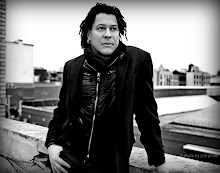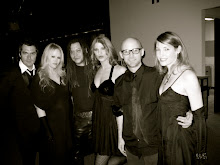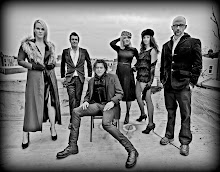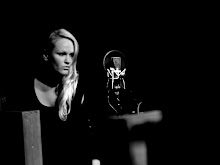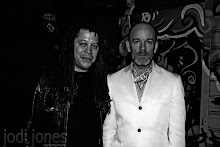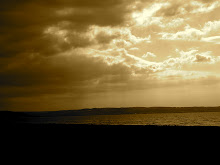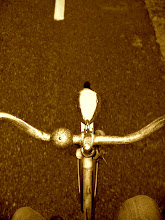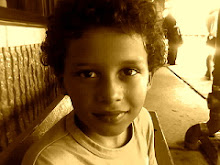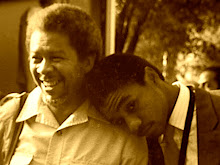"On this bridge," Lorca warns, "life is not a dream. Beware. And beware. And beware." And so many think because Then happened, Now isn't. But didn't I mention the ongoing "wow" is happening right now? We are all co-authors of this dancing exuberance where even our inabilities are having a roast. We are the authors of ourselves, co-authoring a gigantic Dostoevsky novel, starring clowns. This entire thing we're involved with called the world, is an opportunity to exhibit how exciting alienation can be. Life is a matter of a miracle that is collected over time by moments, flabbergasted to be in each other's presence. The world is an exam to see if we can rise into direct experience. Our eyesight is here as a test to see if we can see beyond it. Matter is here as a test for our curiosity. Doubt is here as an exam for our vitality. Thomas Mann wrote that he would rather participate in life than write 100 stories. Giacometti was once run down by a car, and he recalled falling into a lucid faint, a sudden exhilaration, as he realized that at last something was happening to him. An assumption develops that you cannot understand life and live life simultaneously. I do not agree entirely. Which is to say I do not exactly disagree. I would say that life understood is life lived. But the paradoxes bug me, and I can learn to love and make love to the paradoxes that bug me. And on really romantic evenings of self, I go salsa dancing with my confusion. Before you drift off, don't forget. Which is to say, remember. Because remembering is so much more a psychotic activity than forgetting. Lorca, in that same poem said that the iguana will bite those who do not dream. And as one realizes that one is a dream figure in another person's dream, that is self awareness.
Friday, June 22, 2007
Wednesday, June 20, 2007
"Free Will"
This is some heady fucking theory...dig it! I did...
"In a way, in our contemporary world view, it's easy to think that science has come to take the place of God. But some philosophical problems remain as troubling as ever. Take the problem of free will. This problem has been around for a long time, since before Aristotle in 350 B.C. St. Augustine, St. Thomas Aquinas, these guys all worried about how we can be free if God already knows in advance everything you're gonna do. Nowadays we know that the world operates according to some fundamental physical laws, and these laws govern the behavior of every object in the world. Now, these laws, because they're so trustworthy, they enable incredible technological achievements. But look at yourself. We're just physical systems too, right? We're just complex arrangements of carbon molecules. We're mostly water, and our behavior isn't gonna be an exception to these basic physical laws. So it starts to look like whether its God setting things up in advance and knowing everything you're gonna do or whether it's these basic physical laws governing everything, there's not a lot of room left for freedom.
So now you might be tempted to just ignore the question, ignore the mystery of free will. Say "Oh, well, it's just an historical anecdote. It's sophomoric. It's a question with no answer. Just forget about it." But the question keeps staring you right in the face. You think about individuality for example, who you are. Who you are is mostly a matter of the free choices that you make. Or take responsibility. You can only be held responsible, you can only be found guilty, or you can only be admired or respected for things you did of your own free will. So the question keeps coming back, and we don't really have a solution to it. It starts to look like all our decisions are really just a charade.
Think about how it happens. There's some electrical activity in your brain. Your neurons fire. They send a signal down into your nervous system. It passes along down into your muscle fibers. They twitch. You might, say, reach out your arm. It looks like it's a free action on your part, but every one of those - every part of that process is actually governed by physical law, chemical laws, electrical laws, and so on.
So now it just looks like the big bang set up the initial conditions, and the whole rest of human history, and even before, is really just the playing out of subatomic particles according to these basic fundamental physical laws. We think we're special. We think we have some kind of special dignity, but that now comes under threat. I mean, that's really challenged by this picture.
So you might be saying, "Well, wait a minute. What about quantum mechanics? I know enough contemporary physical theory to know it's not really like that. It's really a probabilistic theory. There's room. It's loose. It's not deterministic." And that's going to enable us to understand free will. But if you look at the details, it's not really going to help because what happens is you have some very small quantum particles, and their behavior is apparently a bit random. They swerve. Their behavior is absurd in the sense that its unpredictable and we can't understand it based on anything that came before. It just does something out of the blue, according to a probabilistic framework. But is that going to help with freedom? I mean, should our freedom be just a matter of probabilities, just some random swerving in a chaotic system? That starts to seem like it's worse. I'd rather be a gear in a big deterministic physical machine than just some random swerving.
So we can't just ignore the problem. We have to find room in our contemporary world view for persons with all that that entails; not just bodies, but persons. And that means trying to solve the problem of freedom, finding room for choice and responsibility, and trying to understand individuality".
-An excerpt from the film "Waking Life" by Richard Linkletter
Posted by
Aaron A. Brooks
at
8:46 PM
0
comments
![]()


